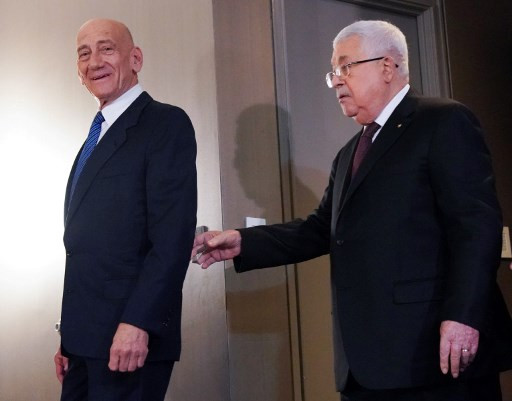Popular Reads
Top Results
Can't find what you're looking for?
View all search resultsPopular Reads
Top Results
Can't find what you're looking for?
View all search resultsSecurity Council rejects Trump’s Mideast deal but cancels resolution vote
Indonesia, together with a majority of United Nations Security Council members, rejected the United States’ recently announced Middle East peace plan during a council debate on Tuesday but has backed down from proposing a vote for a resolution condemning the proposal.
Change text size
Gift Premium Articles
to Anyone
I
ndonesia, together with a majority of the United Nations Security Council members, rejected the United States’ recently announced Middle East peace plan during a council debate on Tuesday but has backed down from proposing a vote for a resolution condemning the proposal.
All 15 member countries except the US distanced themselves from US President Donald Trump’s so-called “deal of the century”, which was overwhelmingly considered to have failed in securing the rights and meeting the aspirations of the Palestinian people.
Indonesian Ambassador to the UN Dian Triansyah Djani said the Palestinian-Israeli conflict needed a two-state solution developed under credible multilateral negotiations and guided by internationally agreed-upon parameters in accordance with international law.
He called on the Security Council to be more involved in addressing the Palestinian struggle.
“The Security Council cannot afford to be seen as a spectator in the maintenance of international peace and security, particularly in securing the independence of Palestine,” he said in the session broadcasted on the UN website.
On Jan. 28, Trump announced the Middle East peace plan in a joint address with Israeli leader Benjamin Netanyahu. The proposed plan laid out a vision for establishing a Palestinian state while also legalizing Israeli rule over settlements built in occupied territory. The plan, which was drafted without consulting the Palestinians, dictates strict conditions for them to follow, including a requirement that the future Palestinian state be demilitarized.
Palestinian President Mahmud Abbas, who was present at the Security Council meeting, denounced Trump’s proposal as a "Swiss cheese" deal that would give the Palestinians only a "fragmented state" without control of their airspace, territorial waters or East Jerusalem.
Brandishing a large map of a future Palestine as laid out by Trump, Abbas denounced the plan and warned that Israel would create an “apartheid” situation if it moved ahead with annexation. "Who among you would accept such a state?" Abbas asked the council, as quoted by Reuters.
UN Secretary General Antonio Guterres reiterated the world body’s commitment “to the vision of two states, Israel and Palestine, living side by side in peace and security within recognized borders, based on the pre-1967 lines.”
Meanwhile, US Ambassador to the UN Kelly Craft described her country’s plan as “specific and realistic”, offering the prospect of a self-governing and fully recognized Palestinian state while touting the possibility of an investment of more than US$50 billion in Palestine.
Other council members called the Trump proposal a unilateral plan that excluded input from the Palestinians.
Despite the strong condemnation during the council session, the Palestinians dropped plans for a vote on a resolution pushed by Indonesia and Tunisia that would have implicitly criticized Trump's plan, including Israel's retention of Jewish settlements in the West Bank.
AFP reported that the United States had put heavy pressure, including threats of financial repercussions, on Security Council members and that even some European nations were hesitant.
According to diplomats at the UN, the draft resolution had attracted 11 or 12 votes in favor of the passage of the resolution by the 15-member council.
Another diplomat said, as quoted by Reuters, that it would have required too many compromises to get the 14-1 vote that the Palestinians had sought. The US still has the power to veto any council resolution it dislikes.
A senior US official hailed the development, saying, "By not putting forward a polarizing resolution, the United Nations Security Council demonstrated that the old way of doing things is over."
Hamdan Basyar, a Middle East expert from the Indonesian Institute of Sciences (LIPI) said that one of the possible reasons why Palestine decided to forfeit its plan was to consolidate support among rival Palestinian factions.
"Even though both Fatah and Hamas rejected Trump's proposal, they do not have any counter proposal,” the scholar said on Wednesday, referring to the ruling Palestinian party in government and the Islamist rulers of the Gaza Strip.
Hamdan said the Palestinians would have a better chance and likely more support if they tabled the draft resolution at the UN General Assembly, where it could be passed without the threat of a US veto, but also risk being legally nonbinding.
Indonesia has previously said it will consult with the Palestinians before taking any action at the Security Council.
As a staunch supporter of the Palestinian struggle for statehood, Indonesia has consistently backed the cause both at the national level and in global forums such as the UN and ASEAN.
But as the Palestinian position weakens in the face of a Jewish state emboldened by Washington, Indonesia and other like-minded countries face an uphill battle in consolidating further support for the cause.
On Wednesday, Foreign Minister Retno Marsudi tweeted about her visit to the leadership of Muhammadiyah in Yogyakarta to raise the issue of Palestine, in an apparent move to garner support for Palestine from Indonesia’s large Muslim grassroots.
The day before, Retno also met with leaders of Indonesia’s largest Muslim group, Nahdlatul Ulama, to consult about the Palestinian cause.
"We have been consistent in supporting the cause of the Palestinian people. [But] the struggle [...] is not getting easier; in fact it has grown more difficult,” she told reporters on Tuesday.
“It is a tough road ahead but I believe that if we talk about bringing justice, then this is what we have to do.” (tjs)
– Apriza Pinandita contributed to the report
Editor's note: Updated with expert comments, details










